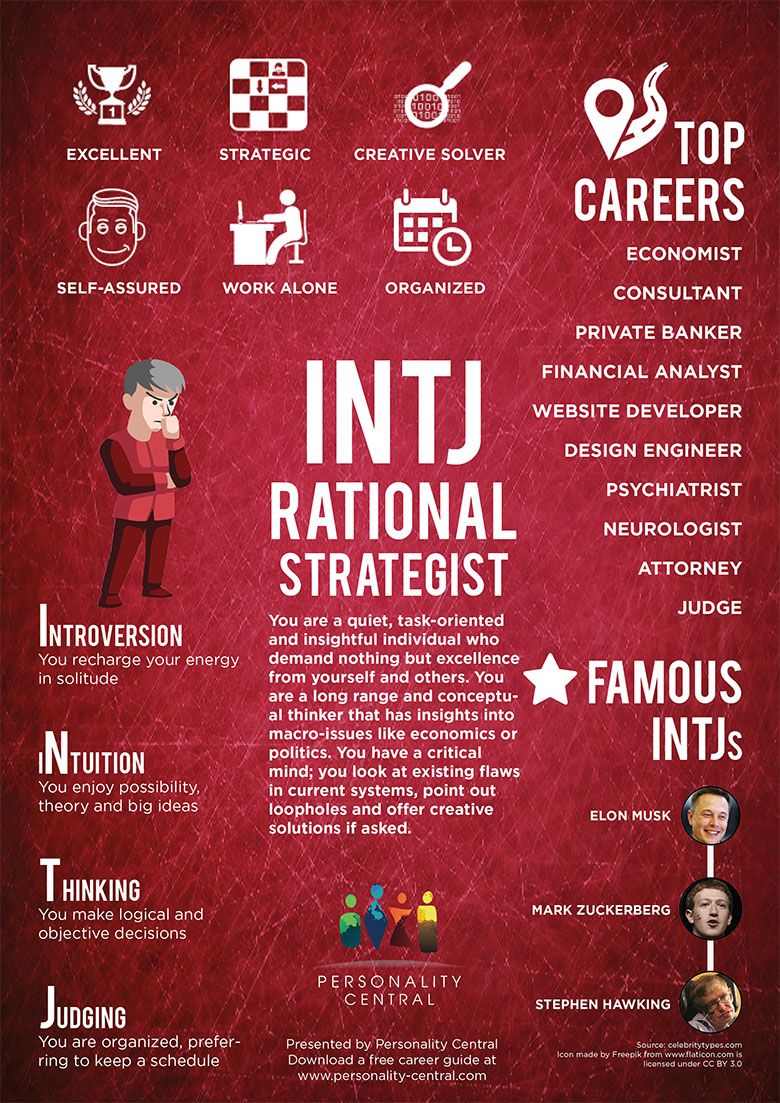Myers Briggs INTJ
The Strategist
Myers Briggs INTJ - Summary
- Have original minds and great drive for implementing their ideas and achieving their goals.
- Quickly patterns in external events and develop long-term explanatory perspectives.
- When committed, organise a job and carry it through.
- Sceptical and independent, have high standards of competence and performance - for themselves and others.
Myers Briggs INTJ - Characteristics
- Myers Briggs INTJs apply (often ruthlessly) the criterion "Does it work?" to everything from their own research efforts to the prevailing social norms. This in turn produces an unusual independence of mind, freeing them from the constraints of authority, convention, or sentiment for its own sake.
- INTJs are known as the "Systems Builders" of the types, perhaps in part because they possess the unusual trait combination of imagination and reliability. Whatever system they happen to be working on is for them the equivalent of a moral cause; both perfectionism and disregard for authority may come into play.
- Personal relationships, particularly romantic ones, can be the their Achilles heel. This happens in part because many do not readily grasp the social rituals.
- Perhaps the most fundamental problem, however, is that INTJs really want people to make sense.
- They are analytical. Like INTPs, they are most comfortable working alone and tend to be less sociable than other types.
- Nevertheless, they are prepared to lead if no one else seems up to the task, or if they see a major weakness in the current leadership.
- They tend to be pragmatic, logical, and creative. They have a low tolerance for spin or rampant emotionalism. They are not generally susceptible to catchphrases and do not recognize authority based on tradition, rank, or title.
- INTJs are strong individualists who seek new angles or novel ways of looking at things. They enjoy coming to new understandings.
- They tend to be insightful and mentally quick; however, this mental quickness may not always be outwardly apparent to others since they keep a great deal to themselves.
- They are very determined people who trust their vision of the possibilities, regardless of what others think. They may even be considered the most independent of all of the sixteen personality types. They are at their best in quietly and firmly developing their ideas, theories, and principles.
- Hallmarks of the INTJ include independence of thought and a desire for efficiency. They work best when given autonomy and creative freedom. They harbour an innate desire to express themselves by conceptualising their own intellectual designs.
- They have a talent for analysing and formulating complex theories. They are generally well-suited for occupations within academia, research, management, engineering, and law. They are often acutely aware of their own knowledge and abilities—as well as their limitations and what they don't know (a quality that tends to distinguish them from INTPs). They thus develop a strong confidence in their ability and talents, making them natural leaders.
- In forming relationships INTJs tend to seek out others with similar character traits and ideologies. Agreement on theoretical concepts is an important aspect of their relationships.
- By nature they can be demanding in their expectations, and they approach relationships in a rational manner. As a result they may not always respond to a spontaneous infatuation but wait for a mate who better fits their set criteria. They tend to be stable, reliable, and dedicated. Harmony in relationships and home life tends to be extremely important to them.
- They generally withhold strong emotion and do not like to waste time with what they consider irrational social rituals. This may cause non-INTJs to perceive them as distant and reserved. Nevertheless, they are usually very loyal partners who are prepared to commit substantial energy and time into a relationship to make it work.
Take the Myers Briggs Test [Note: This currently costs $49.99]
Return to main page: Myers Briggs Type Indicators
LATEST ARTICLES
Master The Season You Are In - The Key to Fulfilling Your Purpose
 To fulfil your purpose, you must first master the season you are in. One of the biggest mistakes you can make in life is focusing all your energy on the next season instead of learning to master the s…
To fulfil your purpose, you must first master the season you are in. One of the biggest mistakes you can make in life is focusing all your energy on the next season instead of learning to master the s…The Inner Weight of Shame - Sustained By Attentional Fixation
 A Mind That Is Continuously Engaged In Self-Surveillance. Shame is one of the heaviest inner burdens a human being can carry. It does not announce itself loudly or demand attention through drama. Inst…
A Mind That Is Continuously Engaged In Self-Surveillance. Shame is one of the heaviest inner burdens a human being can carry. It does not announce itself loudly or demand attention through drama. Inst…Does Prayer Work? The Psychology of Prayer, Meditation and Outcomes
 Reality Is A Complex System Of Countless Interactions - Including Yours. So does prayer work? The problem is that the question itself is usually framed in a way that guarantees confusion. We tend to a…
Reality Is A Complex System Of Countless Interactions - Including Yours. So does prayer work? The problem is that the question itself is usually framed in a way that guarantees confusion. We tend to a…Living in Survival Mode Without Surrendering Mental Authority
Living in Survival Mode Without Surrendering Mental Authority
 Clear Thinking When You’re Just Trying to Stay Afloat. Many people today are overwhelmed because they are living in survival mode - not temporarily, but as a persistent condition of life. For many, th…
Clear Thinking When You’re Just Trying to Stay Afloat. Many people today are overwhelmed because they are living in survival mode - not temporarily, but as a persistent condition of life. For many, th…Manifestation Without Magic: A Practical Model
 Manifestation without magic is not a softer or more intellectual version of popular manifestation culture. It is a different model altogether. Popular manifestation teachings tend to frame reality as…
Manifestation without magic is not a softer or more intellectual version of popular manifestation culture. It is a different model altogether. Popular manifestation teachings tend to frame reality as…Staying Committed When You Can't See Progress - The Psychology of Grit
 Uncertainty Is Not The Absence Of Progress, Only The Absence Of Reassurance. One of the most destabilising experiences in modern life is not failure, but uncertainty and staying committed when you can…
Uncertainty Is Not The Absence Of Progress, Only The Absence Of Reassurance. One of the most destabilising experiences in modern life is not failure, but uncertainty and staying committed when you can…The Battle For Your Mind - How To Win Inner Freedom In A Digital Age Of Distraction
 From External Events to Inner Events. We often think of “events” as things that happen out there: the traffic jam, the rude comment, the delayed email reply. But what truly shapes our experience is wh…
From External Events to Inner Events. We often think of “events” as things that happen out there: the traffic jam, the rude comment, the delayed email reply. But what truly shapes our experience is wh…How to See Your Thoughts Without Becoming the Story
 A Practical Guide to Thought-Awareness. You can spend your life inside the stories of your mind without ever learning how to see your thoughts clearly and objectively. Most of the stuff we tell oursel…
A Practical Guide to Thought-Awareness. You can spend your life inside the stories of your mind without ever learning how to see your thoughts clearly and objectively. Most of the stuff we tell oursel…The Collison Decision Matrix - A Simple Framework for Better Choices
 The Collison Decision Matrix Is A Practical Everyday Thinking Tool. Most of us spend a surprising amount of time worrying about decisions. From small ones such as what to wear, what to eat, what to te…
The Collison Decision Matrix Is A Practical Everyday Thinking Tool. Most of us spend a surprising amount of time worrying about decisions. From small ones such as what to wear, what to eat, what to te…The Power Of Asking The Right Question
 The Power Of Asking The Right Question Lies In The Quest For Insight. To experience the power of asking the right question you must develop the practice of asking questions. The best way to improve th…
The Power Of Asking The Right Question Lies In The Quest For Insight. To experience the power of asking the right question you must develop the practice of asking questions. The best way to improve th…Site Pathways
 Here is a site pathway to help new readers of Zen-Tools navigate the material on this site. Each pathway is based around one of the many key themes covered on this site and contain a 150 word introduc…
Here is a site pathway to help new readers of Zen-Tools navigate the material on this site. Each pathway is based around one of the many key themes covered on this site and contain a 150 word introduc…
